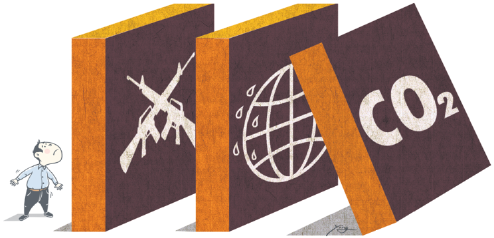Add war to the effects of climate change
Updated: 2016-08-10 08:26
By OP RANA(China Daily)
|
||||||||
 |
| Wang Xiaoying / China Daily |
Thanks to the sluggish global economy, rising terrorist attacks and the refugee crisis in Europe, the world has all but forgotten about the effects of climate change. But a new study shows it is precisely for these reasons that we should take seriously the deadly impacts of climate change. Heat waves, droughts, floods and other natural disasters are expected to increase because of climate change, which not surprisingly are also pushing countries and regions, especially those already split along ethnic, religious or sectarian lines, toward conflicts, says a new study by German scientists.
Climate scientists, including those in the UN Intergovernmental Panel on Climate Change, have already warned that if temperatures increase significantly, large parts of the Earth could become uninhabitable, forcing millions of people to migrate to other places in search of food and livelihood, which will significantly increase the risk of conflicts breaking out. Now the new study by German academics has established a "statistical link" between the outbreak of large-scale violence and extreme weather conditions.
In 2007, some scientists and academics said the conflict in Darfur, then part of united Sudan, was nothing but a "climate war". UN Secretary-General Ban Ki-moon even said: "The Darfur conflict began as an ecological crisis arising at least in part from climate change". Although many academics dismissed the contention claiming rainfall had eased drought conditions before the start of the civil war in Sudan, the impact of climate change on conflicts in African and other countries is yet to be fully analyzed.
The linking of conflicts to natural disasters has been controversial, particularly because some studies comparing wars to temperature, for example, did not yield the desired results. But the German researchers used data from international reinsurance company Munich Re. They combined the figures with information on conflicts and used an index to quantify how "ethnically fractionalized" countries are. They then conducted a statistical analysis of armed conflicts and climate-related natural disasters between 1980 and 2010, and their conclusion that 1 in every 4 conflicts in ethnically divided countries coincided with or followed natural calamities suggests that wars should be added to the threats-which include rising sea levels, crop failures, droughts, water shortages and floods-posed by climate change.
Drought and arid conditions in Syrian from 2006 to 2011-the worst in recorded history in the Levant where wheat and other food crops were first cultivated-destroyed agriculture, causing many farmers and their families to migrate to cities. Last year, Richard Seager, a climate scientist at Columbia University's Lamont-Doherty Earth Observatory who co-authored an earlier study, said the drought and arid conditions "added to all the other stressors" that could have led to the civil war in Syria. And a drought of that magnitude was made possible "by the ongoing human-driven drying of that region".
The new German research report says: "Recent analyses of the societal consequences of droughts in Syria and Somalia indicate that such climatological events may have already contributed to armed conflict outbreaks ... (and) the destabilization of Northern Africa and the Levant may have widespread effects by triggering migration flows to neighboring countries and remote migrant destinations such as the European Union."
Jonathan Donges, co-writer of the German study, is surprised "by the extent that results for ethnic fractionalized countries stick out, compared to other country features such as conflict history, poverty or inequality".
"We think that ethnic divides may serve as a predetermined conflict line when additional stressors like natural disasters kick in, making multi-ethnic countries particularly vulnerable to the effects of such disasters", Donges said
Not surprisingly, many have already rubbished the findings of the two studies. But there is not denying that despite the denials, the need for international action on climate change remains strong enough. And the world can only ignore that at its own peril.
The author is a senior editor with China Daily. oprana@hotmail.com
- International trade corridor tested
- Netizens go crazy for beautiful young doctor who helps woman give birth in shopping mall
- Organ harvesting rumors slammed
- Beijing to try out 5G in key areas by 2020
- Nation's next generation of missiles to be highly flexible
- Li urges top advisers to rely on broad vision
- Malaysian authorities say ship carrying diesel hijacked
- Army commander: THAAD would 'easily affect' China-US ties
- Twin panda cubs confirmed born in Vienna zoo
- Four killed in boat collision in Greece
- Premier Li to receive Aung San Suu Kyi
- S Korean president names 3 new ministers for partial reshuffle

 Top 10 cities with highest GDP in H1
Top 10 cities with highest GDP in H1
 Chinese teenagers take gold, silver on 10m platform
Chinese teenagers take gold, silver on 10m platform
 US granted re-run to send China out of relay race
US granted re-run to send China out of relay race
 China inches toward gold after beating Netherlands
China inches toward gold after beating Netherlands
 Premier Li welcomes Aung San Suu Kyi
Premier Li welcomes Aung San Suu Kyi
 Zhao wins China's first gold medal in men's taekwondo
Zhao wins China's first gold medal in men's taekwondo
 World's top 10 innovative economies
World's top 10 innovative economies
 Dancing, food and religion, all in a Xinjiang wedding
Dancing, food and religion, all in a Xinjiang wedding
Most Viewed
Editor's Picks

|

|

|

|

|

|
Today's Top News
Trump outlines anti-terror plan, proposing extreme vetting for immigrants
Phelps puts spotlight on cupping
US launches airstrikes against IS targets in Libya's Sirte
Ministry slams US-Korean THAAD deployment
Two police officers shot at protest in Dallas
Abe's blame game reveals his policies failing to get results
Ending wildlife trafficking must be policy priority in Asia
Effects of supply-side reform take time to be seen
US Weekly

|

|









